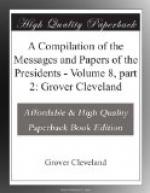Holding the opinion, as I do, that neither the interests of the Government nor of the people of the United States would be promoted by disparaging silver as one of the two precious metals which furnish the coinage of the world, and that legislation which looks to maintaining the volume of intrinsic money to as full a measure of both metals as their relative commercial values will permit would be neither unjust nor inexpedient, I must ask your indulgence to a brief and definite statement of certain essential features in any such legislative measure which I feel it my duty to recommend.
I do not propose to enter the debate, represented on both sides by such able disputants in Congress and before the people and in the press, as to the extent to which the legislation of any one nation can control this question, even within its own borders, against the unwritten laws of trade or the positive laws of other governments. The wisdom of Congress in shaping any particular law that may be presented for my approval may wholly supersede the necessity of my entering into these considerations, and I willingly avoid either vague or intricate inquiries. It is only certain plain and practical traits of such legislation that I desire to recommend to your attention.
In any legislation providing for a silver coinage, regulating its value, and imparting to it the quality of legal tender, it seems to me of great importance that Congress should not lose sight of its action as operating in a twofold capacity and in two distinct directions. If the United States Government were free from a public debt, its legislative dealing with the question of silver coinage would be purely sovereign and governmental, under no restraints but those of constitutional power and the public good as affected by the proposed legislation. But in the actual circumstances of the nation, with a vast public debt distributed very widely among our own citizens and held in great amounts also abroad, the nature of the silver-coinage measure, as affecting this relation of the Government to the holders of the public debt, becomes an element, in any proposed legislation, of the highest concern. The obligation of the public faith transcends all questions of profit or public advantage otherwise. Its unquestionable maintenance is the dictate as well of the highest expediency as of the most necessary duty, and will ever be carefully guarded by Congress and people alike.
The public debt of the United States to the amount of $729,000,000 bears interest at the rate of 6 per cent, and $708,000,000 at the rate of 5 per cent, and the only way in which the country can be relieved from the payment of these high rates of interest is by advantageously refunding the indebtedness. Whether the debt is ultimately paid in gold or in silver coin is of but little moment compared with the possible reduction of interest one-third by refunding it at such reduced rate. If the United States had the unquestioned right to pay its bonds in silver coin, the little benefit from that process would be greatly overbalanced by the injurious effect of such payment if made or proposed against the honest convictions of the public creditors.




